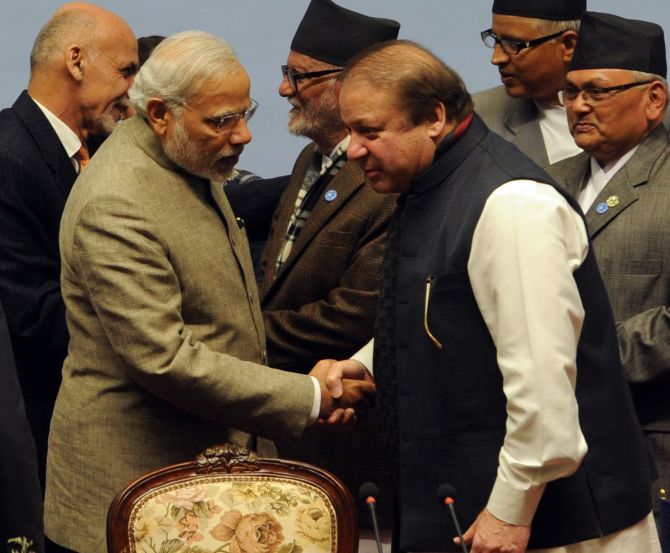
Ties with Pakistan and China which were on the centre stage of Indian diplomacy saw a “deterioration” in the year gone by, according to foreign
policy experts who feel that the relationships are unlikely to see any forward movement in the new year.
The foreign policy establishment has reached the conclusion that “no war, no peace” situation in the relationship with Pakistan will persist in 2017 given that it is not doing anything to stop terrorism directed at India.
The year gone by also saw growing distance between India and its traditional ally Russia and hardening of Chinese positions on two strategically significant issues to New Delhi – Nuclear Suppliers Group and Masood Azhar, whose designation as terrorist by the United Nations was blocked by Beijing last week.
Foreign policy experts like G Parthasarathy, Kanwal Sibal and Naresh Chandra maintained that relationship with Pakistan “deteriorated” in 2016 and even with China there was no forward movement in ties.
Parthasarthy, however, said India has made it clear to both Pakistan and China that it won’t ignore their actions which have a bearing on the country’s security.
“For the first time with Pakistan and China, we are responding. In case of China for example, we now have taken a position on the (disputed) South China Sea...”, Parthasarthy said.
And with Pakistan, India has been able to convince the world that Prime Minister Narendra Modi tried his best to improve the ties and since they inflicted Pathankot and series of attacks on India, the government told Pakistan “enough is enough” by carrying out surgical strikes, the former high
commissioner to Pakistan added.
India had also launched a major diplomatic offensive to isolate Pakistan internationally following terror strikes including Pathankot, Uri and Nagrota.
“I think the message is loud and clear to both Pakistan and China that it takes two to tango. We are willing to reach out to you. But if you choose to remain totally ignoring what are our interests, we will react... the position is clear that anybody who harms our interest will pay a price without being provocative,” he added.
However, most of the foreign policy experts also feel that the Indo-Pak ties are not expected to see any early breakthrough in the new year.
The establishment also has come to a realization that India has to live with the “no war, no peace” situation vis-a-vis Pakistan, a senior government source said.
“With China, relationship has deteriorated despite the fact that the PM and Chinese President Xi Jinping met three times in 2016 and Modi raised the issues which are of concern to us. The outcome has not been satisfactory because not only there is no change in China’s position but they are asserting their negative position on our NSG membership quite openly,” Sibal said.
On growing distance between India and its traditional ally Russia amid increasing proximity between Moscow and Islamabad in 2016, Sibal, a former foreign secretary, admitted that it was a matter of “concern”.
“Yes, it is a concern because the (Indo-Russia) relationship has been stable right from 50s till today. We had ups and downs but they were manageable... If that relationship begins to erode then it is a problem for us because Russia remains our major defence partner,” Sibal said.
Former Indian Ambassador to the US, Chandra also noted that despite India’s protest, Russia did military exercises with Pakistan.
The South Block sources, however, played down China scuttling India’s NSG bid as well as blocking Pakistan-based Jaish-e-Mohammed chief Azhar’s listing as terrorist by the UN, saying there will always be differences between any two countries but the maturity is that “one should not allow these differences to become conflicts”.
The sources also maintained that though the developing equations between Pakistan-Russia and Pakistan-China needed to be “monitored” but it was not an “alarming” situation.
One of the high points in Modi’s foreign policy has been his personal equation with outgoing US President Barack Obama and now it remains to be seen that how the Indo-US ties would pan out in the new year given that President-elect Donald Trump’s approach towards India is unknown even though he has made right remarks about Indians.
During the last year of Obama’s presidency, India and the US also signed a strategic defence pact under which the country became US’ “major defence partner”.
The year gone by also saw development of military dimension in Indo-Afghan ties. India already has an effective economic cooperation programme, having spent more than $2 billion and committed another billion dollars earlier this year.
The government’s demonetisation decision saw foreign missions lodging strong protest over cash shortage and calling for easing the restrictions on cash withdrawal. Dean of Diplomatic Corp Frank Hans Dannenberg Castellanos, who represents over 150 missions, even termed the restrictions
“serious breach” of Vienna Convention.
The year 2016 also saw Modi’s high-profile visits to a number of countries including Japan, Saudi Arabia, Afghanistan, Iran, Mexico, Switzerland, South Africa and Belgium.










